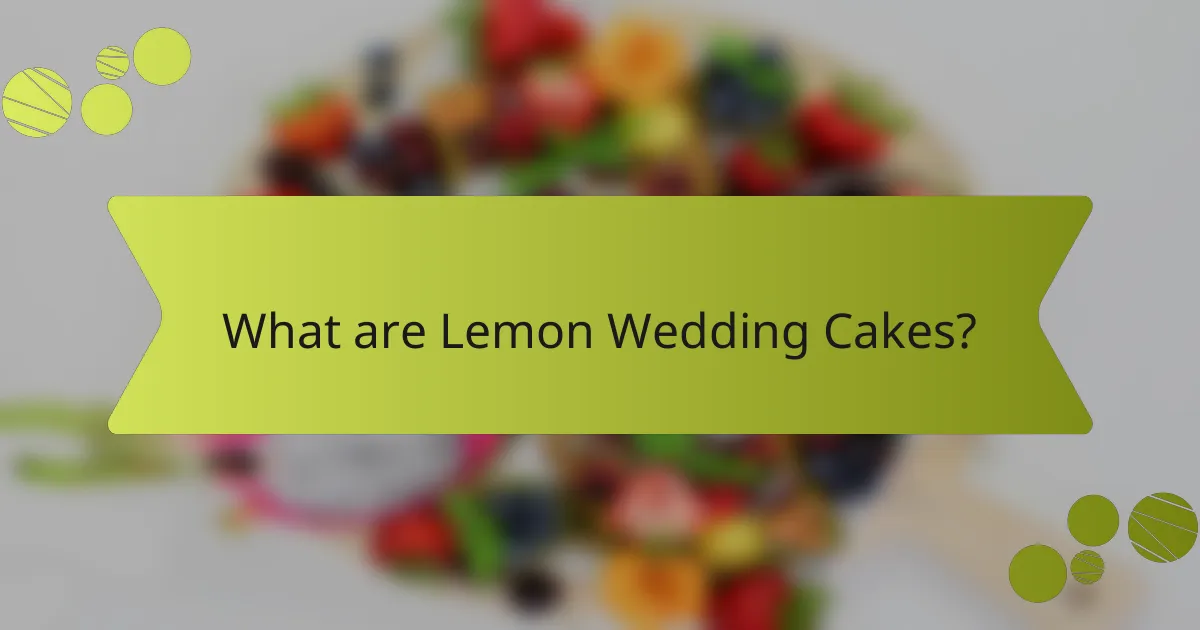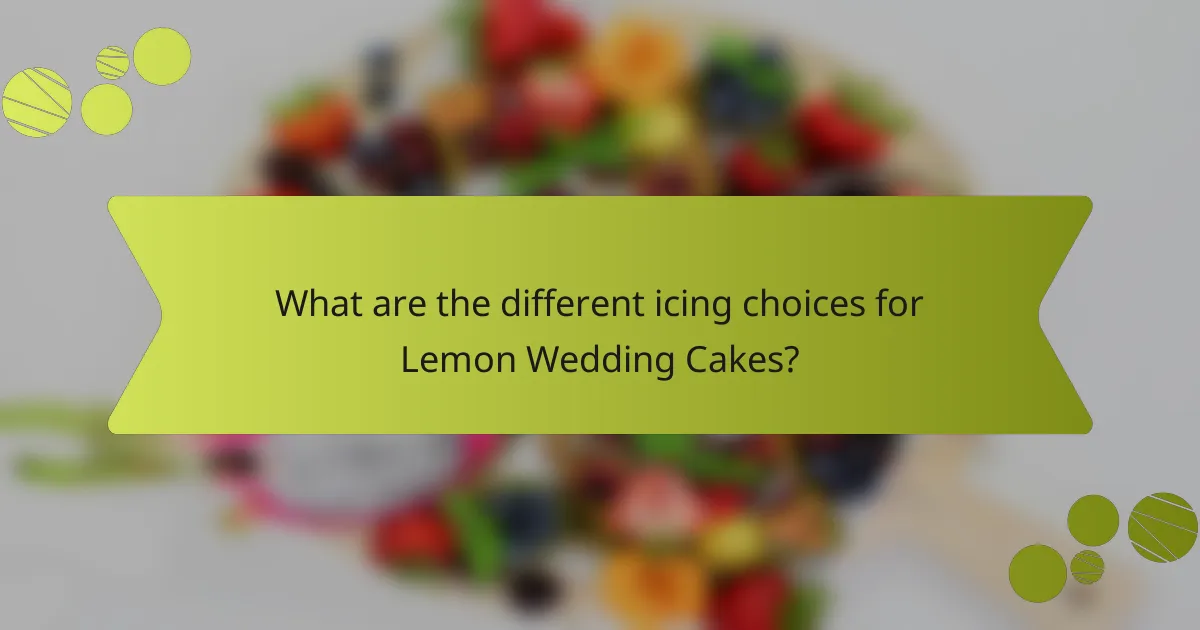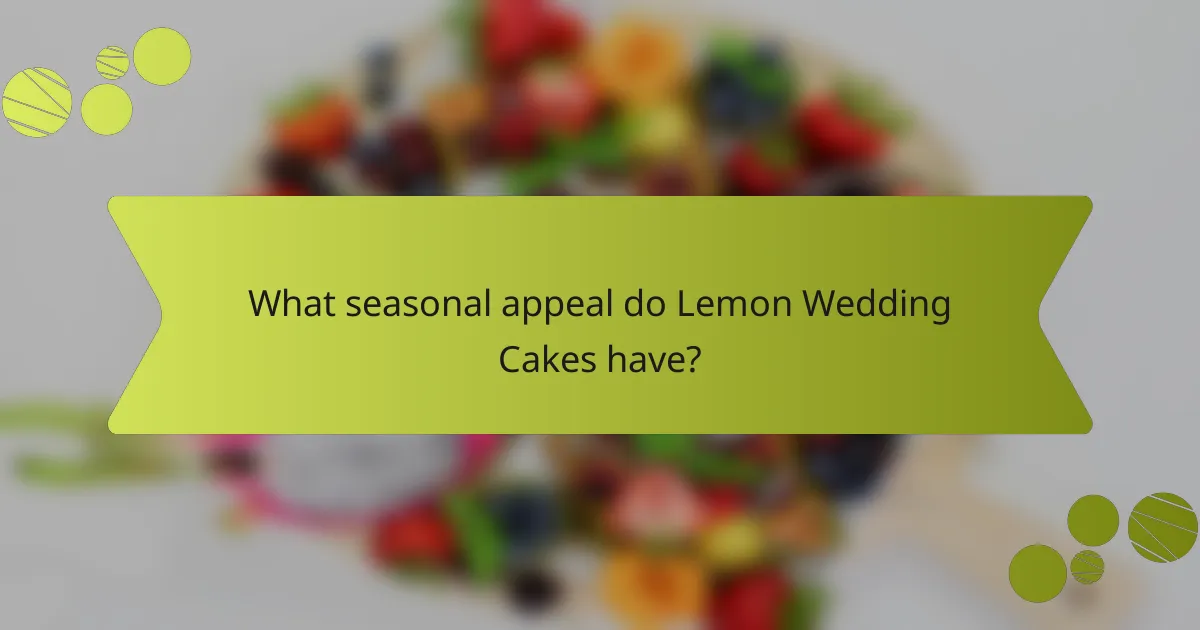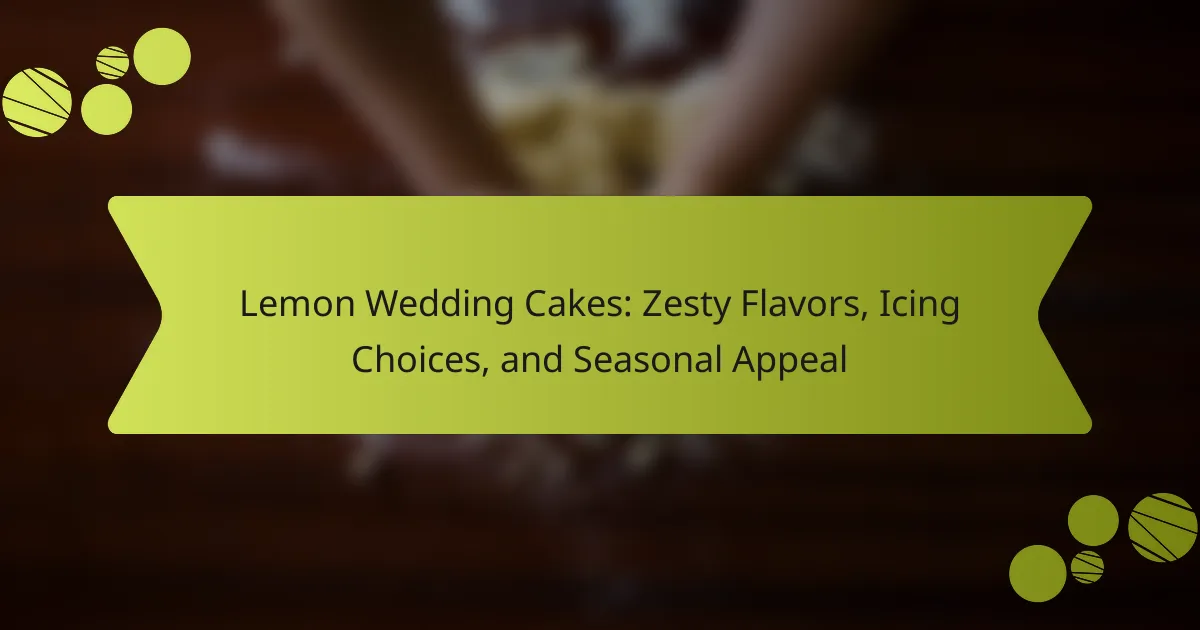Lemon wedding cakes are a popular dessert choice for weddings, featuring lemon as the primary flavor, which offers a fresh and zesty taste. These cakes come in various styles, including layered and tiered designs, and are often paired with lemon-flavored frosting or fillings such as lemon buttercream, cream cheese frosting, and fondant. Their light flavor profile makes them especially appealing for spring and summer weddings, aligning with seasonal themes of renewal and freshness. The increasing popularity of lemon in wedding cakes reflects a broader trend towards citrus flavors in desserts, providing couples with a unique and memorable option for their special day.

What are Lemon Wedding Cakes?
Lemon wedding cakes are a type of dessert specifically designed for weddings. They feature lemon as the primary flavor, providing a fresh and zesty taste. These cakes can be made in various styles, including layered or tiered designs. They are often complemented with lemon-flavored frosting or fillings. The use of lemon adds a bright and refreshing element to traditional wedding cakes. Many couples choose lemon wedding cakes for spring or summer weddings due to their light flavor profile. The popularity of lemon in wedding cakes has been increasing, reflecting a trend towards citrus flavors in desserts. This appeal is often linked to the desire for unique and memorable wedding experiences.
How do Lemon Wedding Cakes differ from traditional wedding cakes?
Lemon wedding cakes differ from traditional wedding cakes primarily in flavor and ingredients. Lemon wedding cakes feature a zesty, citrus flavor profile that is distinct from the typical vanilla or chocolate flavors of traditional cakes. The use of fresh lemon juice and zest provides a refreshing taste that is often lighter.
Additionally, lemon cakes may include unique ingredients like lemon curd or a lemon-infused syrup, enhancing their tangy profile. Traditional wedding cakes often rely on buttercream or fondant for decoration, while lemon cakes might be paired with lighter icings, such as cream cheese or whipped cream.
The texture of lemon cakes can also be more moist due to the acidity of the lemon. This moistness contrasts with the denser textures found in many traditional cakes. Overall, lemon wedding cakes offer a vibrant alternative that appeals especially during warmer seasons or for couples seeking a unique flavor experience.
What unique flavors are found in Lemon Wedding Cakes?
Lemon Wedding Cakes feature unique flavors such as tart lemon zest, sweet vanilla, and buttery notes. The tartness from lemon zest enhances the cake’s overall brightness. Sweet vanilla complements the lemon, balancing its acidity. Buttery notes provide richness, creating a moist texture. Some variations include hints of almond or coconut for added depth. Additionally, floral flavors like lavender may be incorporated for a sophisticated touch. Each flavor contributes to a refreshing and celebratory dessert experience.
How does the texture of Lemon Wedding Cakes compare to other cakes?
Lemon Wedding Cakes typically have a light and moist texture. This texture is often achieved through the use of fresh lemon juice and zest, which adds moisture. Compared to other cakes, such as chocolate or vanilla, Lemon Wedding Cakes may feel less dense. The incorporation of ingredients like buttermilk or yogurt can enhance their tenderness. Additionally, the citrus flavor contributes to a refreshing mouthfeel. Many bakers prefer using a sponge or chiffon cake base for Lemon Wedding Cakes, which further distinguishes their texture. The result is a cake that is airy yet rich in flavor, setting it apart from denser varieties.
Why are Lemon Wedding Cakes popular for weddings?
Lemon wedding cakes are popular for weddings due to their refreshing flavor and vibrant color. The zesty taste of lemon adds a unique twist to traditional wedding cakes. Many couples seek to differentiate their wedding desserts from the usual options. Lemon cakes often symbolize brightness and joy, aligning with wedding themes. Additionally, lemon flavors can evoke a sense of celebration and warmth. Seasonal appeal also plays a role, as lemon is often associated with spring and summer weddings. The citrus notes can complement various wedding themes and palettes. Overall, lemon wedding cakes provide a delightful and memorable experience for guests.
What seasonal factors contribute to the popularity of Lemon Wedding Cakes?
Lemon Wedding Cakes gain popularity due to their refreshing flavor, particularly in warmer months. Spring and summer weddings often feature lighter, citrusy desserts. The bright color of lemon cakes aligns with seasonal floral themes. Seasonal fruits are more abundant during warmer months, enhancing flavor profiles. Additionally, lemon is associated with celebrations and joy, making it a fitting choice for weddings. The trend of outdoor weddings in pleasant weather also boosts the appeal of lighter, zesty cakes.
How do cultural traditions influence the choice of Lemon Wedding Cakes?
Cultural traditions significantly influence the choice of Lemon Wedding Cakes. In many cultures, lemon symbolizes purity and freshness, making it a popular flavor for weddings. For instance, in Mediterranean cultures, citrus flavors are often favored for their bright and refreshing qualities. Additionally, regional customs dictate cake flavors based on seasonal availability of ingredients. In spring and summer weddings, lemon cakes align with seasonal themes, enhancing the celebratory atmosphere. Furthermore, family recipes passed down through generations often include lemon, making it a sentimental choice for couples. These traditions shape not only flavor preferences but also the overall aesthetic and presentation of wedding cakes.

What are the different icing choices for Lemon Wedding Cakes?
Common icing choices for Lemon Wedding Cakes include lemon buttercream, cream cheese frosting, and fondant. Lemon buttercream is popular for its zesty flavor that complements the cake. Cream cheese frosting adds a rich, tangy taste that balances sweetness. Fondant provides a smooth, elegant finish for a polished appearance. Additionally, meringue icing offers a light, airy texture suitable for lemon cakes. Each icing choice enhances the overall flavor profile of the cake while contributing to its aesthetic appeal.
What types of icing pair well with Lemon Wedding Cakes?
Buttercream icing pairs well with Lemon Wedding Cakes. Its creamy texture complements the cake’s citrus flavor. Cream cheese icing also works well, adding tanginess that enhances the lemon. Royal icing provides a smooth finish, ideal for decorative elements. Additionally, lemon glaze offers a fresh burst of citrus that intensifies the cake’s flavor. Each icing type maintains a balance between sweetness and tartness. This balance is crucial for enhancing the overall taste experience.
How does cream cheese icing enhance the flavor of Lemon Wedding Cakes?
Cream cheese icing enhances the flavor of Lemon Wedding Cakes by providing a rich, tangy contrast to the cake’s sweetness. This icing balances the zesty notes of lemon with its creamy texture. The acidity in cream cheese complements the citrus flavor, making it more pronounced. Additionally, the smoothness of the icing adds a luxurious mouthfeel. This combination creates a harmonious flavor profile that elevates the overall taste experience. Many bakers prefer cream cheese icing for its ability to enhance and not overpower the lemon flavor. The result is a well-rounded dessert that appeals to a wide range of palates.
What are the benefits of using fondant versus buttercream on Lemon Wedding Cakes?
Fondant offers a smooth, elegant finish on Lemon Wedding Cakes, enhancing visual appeal. It allows for intricate designs that buttercream cannot achieve as easily. Fondant also creates a barrier that helps retain moisture in the cake, keeping it fresher for longer. In contrast, buttercream provides a rich, creamy flavor that complements the zesty lemon taste. However, buttercream can be more prone to melting in warm weather.
Fondant typically has a longer shelf life than buttercream, making it a practical choice for multi-day events. Additionally, fondant can be rolled out to create a uniform layer, which can help in achieving a polished look. According to baking experts, fondant is often preferred for wedding cakes due to its aesthetic versatility. Conversely, buttercream is favored for its taste and texture, appealing to those who prioritize flavor over appearance.
How can icing choices affect the overall presentation of Lemon Wedding Cakes?
Icing choices significantly influence the overall presentation of Lemon Wedding Cakes. Different icings can enhance or detract from the cake’s vibrant lemon flavor. For example, a smooth buttercream icing provides a classic look and complements the citrus taste. In contrast, a tangy cream cheese frosting can add a unique flavor profile while maintaining visual appeal.
Color choices in icing can also impact presentation. A bright yellow or pastel hue can evoke freshness and align with wedding themes. Additionally, texture variations, such as a glossy fondant or rustic whipped cream, can create distinct visual styles.
Decorative elements, like edible flowers or zest garnishes, can be integrated into the icing for added elegance. Overall, the choice of icing affects not only flavor perception but also the aesthetic appeal of the Lemon Wedding Cake, making it a crucial aspect of cake design.
What decorative techniques can be used with different icing types?
Different icing types can be used with various decorative techniques. Buttercream icing can be piped into flowers, rosettes, and borders. Royal icing is ideal for intricate designs and lacework due to its hardening properties. Fondant allows for smooth finishes and can be molded into shapes or figures. Cream cheese icing can be swirled for a rustic look or piped for detailing. Glaze icing is suitable for a shiny finish and can be drizzled over cakes. Each technique enhances the visual appeal of lemon wedding cakes, complementing their zesty flavors.
How do color choices in icing impact the wedding theme?
Color choices in icing significantly influence the wedding theme. They can enhance the overall aesthetic and mood of the event. For example, soft pastels evoke a romantic atmosphere. Bright colors can create a festive and lively vibe. The color of icing can also align with the couple’s chosen color palette. This alignment ensures a cohesive look throughout the wedding decor. Research shows that color psychology affects emotions and perceptions. Specific colors can symbolize love, joy, or tranquility. Therefore, selecting the right icing color is crucial for reflecting the desired theme.

What seasonal appeal do Lemon Wedding Cakes have?
Lemon Wedding Cakes have a strong seasonal appeal, particularly in spring and summer. Their bright, zesty flavor complements warm weather celebrations. The refreshing taste of lemon provides a light alternative to richer desserts. This makes them popular for outdoor weddings and garden receptions. Additionally, lemon is often associated with renewal and freshness, aligning well with seasonal themes. Their vibrant yellow color also enhances festive decor. Many couples choose lemon cakes for their unique flavor profile and seasonal relevance. This trend reflects a broader preference for citrus flavors in warm months.
How do seasonal ingredients influence Lemon Wedding Cakes?
Seasonal ingredients significantly enhance Lemon Wedding Cakes by adding freshness and depth of flavor. Using ingredients like in-season lemons ensures optimal taste and juiciness. Seasonal berries, such as strawberries and raspberries, can complement lemon flavors in toppings or fillings. Fresh herbs like basil or mint can introduce unique flavor profiles that elevate the cake. The availability of local ingredients often leads to sustainable practices, supporting local farmers. Seasonal variations can also inspire creative recipes, making each wedding cake distinctive. This approach aligns with the trend of using fresh, organic components in modern baking.
What fruits and herbs complement Lemon Wedding Cakes in different seasons?
Strawberries, blueberries, and mint complement Lemon Wedding Cakes in spring and summer. These fruits provide a refreshing contrast to the cake’s tartness. In fall, pears and rosemary enhance the flavor profile with earthy notes. Winter pairs well with cranberries and thyme for a festive touch. Each seasonal pairing enhances the cake’s zesty flavor while adding unique characteristics.
How can seasonal themes be incorporated into Lemon Wedding Cake designs?
Seasonal themes can be incorporated into Lemon Wedding Cake designs by using ingredients and decorations that reflect the specific season. For spring, floral decorations like edible flowers or lemon blossoms can enhance the cake’s aesthetic. In summer, fresh berries or citrus fruits can be added for a vibrant touch. Autumn themes can include spices like cinnamon or nutmeg, paired with caramel drizzles. Winter designs may feature snowflake motifs or a light dusting of powdered sugar to mimic snow. Each of these seasonal elements not only enhances the cake’s visual appeal but also complements the lemon flavor, creating a cohesive theme.
What are the best practices for serving Lemon Wedding Cakes at seasonal events?
Serve Lemon Wedding Cakes at seasonal events by ensuring they are fresh and well-chilled. Freshness enhances the cake’s zesty flavor. Chill the cake for optimal texture and taste. Use light, citrus-flavored icing to complement the lemon. This pairing enhances the overall experience. Consider seasonal decorations like fresh lemons or edible flowers. These visuals attract attention and fit the seasonal theme. Offer slices alongside refreshing beverages like lemonade or iced tea. This combination enhances the cake’s appeal. Lastly, provide clear labeling of ingredients for guests with dietary restrictions. This practice ensures safety and inclusivity.
How can temperature and humidity affect the serving of Lemon Wedding Cakes?
Temperature and humidity significantly impact the serving of Lemon Wedding Cakes. High temperatures can cause the cake to become overly moist and lead to structural instability. This may result in the cake collapsing or losing its shape. Humidity can also affect frosting consistency. High humidity can make buttercream icing too soft, causing it to slide off the cake. Conversely, low humidity may dry out the cake, making it less enjoyable. Proper storage conditions are essential to maintain the cake’s texture and flavor. For example, cakes should be stored in a cool environment and covered to prevent moisture loss. These factors are crucial for ensuring the cake is visually appealing and delicious at the time of serving.
What tips can ensure the freshness of Lemon Wedding Cakes during seasonal celebrations?
To ensure the freshness of Lemon Wedding Cakes during seasonal celebrations, store them in an airtight container. This prevents moisture loss and keeps the cake moist. Refrigeration can extend freshness, especially in warm weather. Wrap the cake in plastic wrap before placing it in the container. For optimal flavor, consume the cake within three days of baking. If freezing, use a freezer-safe container and consume within three months. Thaw the cake in the refrigerator to maintain texture. These methods help preserve the zesty flavors and overall quality of the cake.
Lemon Wedding Cakes are a distinctive dessert option for weddings, characterized by their zesty lemon flavor and light texture. This article explores their unique attributes, including flavor profiles, icing choices, and seasonal appeal, highlighting how they differ from traditional wedding cakes. Additionally, it examines the impact of cultural traditions, seasonal ingredients, and decorative techniques on the overall presentation and enjoyment of these cakes. The discussion emphasizes the growing popularity of lemon cakes for spring and summer weddings, making them a refreshing choice for couples seeking a memorable dessert experience.
